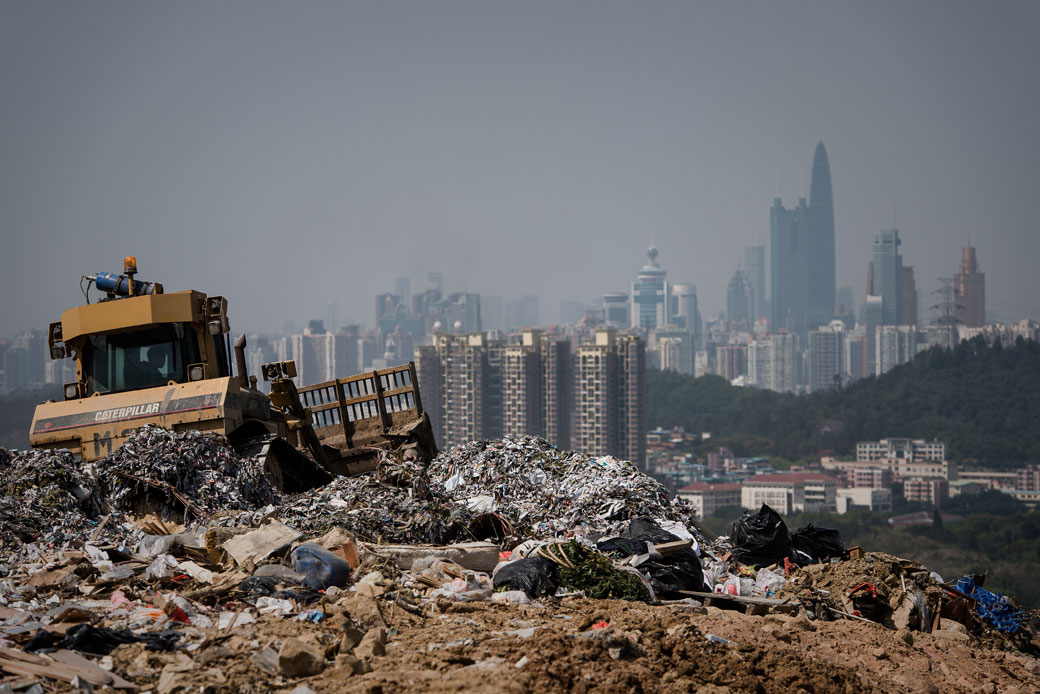TORONTO – Not many of us think about where the garbage we leave at the end of the driveway or drop down a chute ends up.

But as our global population increases, so does urbanization, consumerism, and the amount of garbage we produce.
The result? The world’s garbage crisis is coming to a peak.
In 1900, there were 220 million people living in cities, which generated fewer than 300,000 tonnes of solid waste, including food waste, packaging and other household items.
One hundred years later, more than 2.9 billion people lived in cities and generated three million tonnes.
The concern over solid waste management is a problem that has far-reaching consequences. And Canada is one of the worst offenders in the world.
According to Statistics Canada, in 2010, our country produced 24,883,546 tonnes of garbage, only slightly down from the 2008 number of 25,907,467. Ontario and Quebec were the worst offenders of all sources of solid waste, including residential and non-residential sources.
“The part that I find fascinating about solid waste is that it’s the perfect proxy for the overall impact on the local and global environment,” said Daniel Hoornweg, associate professor, Jeff Boyce Chair, Energy Systems and Nuclear Science at the University of Ontario Institute of Technology in Oshawa. “So, pretty much how much damage we’re doing to the planet is measured by how much solid waste we’re creating.”
As we try to bring third-world countries out of poverty, the challenge will be ensuring that we don’t create further sources of solid waste.
Hoornweg, University of Toronto’s Chris Kennedy and co-author Perinaz Bhada-Tata, recently penned a commentary in the journal Nature. The researchers found that peak garbage is a global problem.
“Garbage is just a symptom of a pretty wasteful energy-resource-intensive global community,” Hoornweg said.
According to their research, landfills such as Bordo Poniente in Mexico City, Mexico, Laogang in Shanghai, China, and Jardim Gramacho in Rio de Janiero, Brazil, each receives more than 10,000 tonnes of waste per day.
In China, expanding cities are adding incinerators which are in turn adding to air pollution.
“It’s this proxy for all of our global and local impacts. The more garbage you have, the more greenhouse gas emissions you have. Probably the more garbage you generate, the more species you wipe out in terms of biodiversity. The more forests you dig up for the trees and the more mines you dig up, overall the more damage you do to the planet,” Hoornweg told Global News.
The researchers found that “peak waste” will occur in roughly 2100. This means that globally, solid waste will continue to rise until then, particularly in urban centres. Solid waste generation will exceed 11 million tonnes per day. That’s three times more than today’s rate. And that’s a big problem.
“The impact all of us are having on the planet today is at a level that the planet can’t handle. It’s kind of breaking apart at the seams,” said Hoornweg.
The goal is to reduce that peak to an earlier date, which Hoornweg and his colleagues say can be done by at least 2075. This would reduce solid waste by about 2.6 million tonnes a day.
The Conference Board of Canada, an independent, non-profit research organization conducts a report entitled How Canada Performs, which assesses our country’s quality of life with that of countries belonging to the Organisation for Economic Co-operation and Development (OECD).
The most recent report gave Canada a grade of D for waste generation, noting that we are producing more than almost every other OECD country.
Brenda Lafleur, Director of How Canada Performs, notes that it is the wealthier countries, like Canada and the United States, that are responsible for creating most of the waste due to our consumerism.
“We have to have a conversation with ourselves about what it means to be a prosperous country and what kind of responsibilities go along with that,” Lafleur said.
Reducing waste
Lafleur noted that some of it lies with manufacturers, and how they choose to package goods, calling it the “Hummer effect,” noting that packaging seems to get bigger and bigger like the Humvee vehicle.
“Our point would be that with wealth and prosperity for consumers comes a responsibility… of how much garbage we produce. Some of it is not the fault of consumers, because some of it has to do with the packaging.”
Some of that extra packaging may be due to health or security reasons, she noted. “But there has to be a better way.”
The only way that we can reach our peak waste earlier, therefore helping to reduce greenhouse gas emissions and overall pollution, is to reduce packaging, having cities that use resources more efficiently and overall less consumption.
“I think it’s between consumers, manufacturers and the government as well,” Hoornweg said.
The other problem is that, globally, we are trying to reduce the numbers of those who live in abject poverty. As we do that, we are creating more wealth, therefore more consumerism. In return, we run the risk of creating more solid waste.
Hoornweg acknowledged that it’s “a bit of a paradox because you’re encouraging people to get rich, but they’re in turn going to generate more waste.”
“We have to figure out how to work together as a planet to bring this total amount of solid waste down,” said Hoornweg.
This means we need to find ways within our already existing urban centres – through manufacturers, consumers and government – to reduce solid waste. Then, we can work together with emerging cities.
But until we do, the garbage will continue to mount, creating greenhouse gas emissions, pollution from ash and impacts on our landscape and biodiversity.





Comments